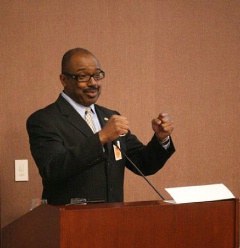
Walter Brown Jr. of W.B. Lending Solutions
Immediate Past President of Urban Financial
Services Coalition
Facing Foreclosure? Don't Just Sit There-Act Now
A shocking 2012 study by the Federal Reserve Bank of Chicago, the Office of the Comptroller of the Currency, University of Chicago and Ohio State University estimates that over 800,000 foreclosures that were done between 2009 and 2010 were done in error ... much like a doctor amputating the wrong leg. (Chicago Tribune 9/20/12).
(Read More: Is the Refi 'Apocalypse' Really Upon Us?)
Studies show that higher rates of home owners in a neighborhood versus renters generally result in better property maintenance, school quality, crime rates and tax base stability.
Higher amounts of rentals generally have the opposite effect.
Home foreclosures can result in neighborhood property devaluation, neighborhood blight, increase in crime, government tax base erosion, family discord and health issues.
The United States Federal Government has put emergency programs into effect to assist financially challenged homeowners as it has also put programs into effect to assist challenged corporations like AIG, Chrysler, Fannie Mae, General Motors, etc. That was the "deal" in Washington, D.C., in 2008.
Currently, the programs to assist corporations are generally succeeding as planned. On the other hand, programs for challenged homeowners are poorly managed and failing miserably ... that doctor amputating the wrong leg. ... This failure is shaping up to be a dark chapter in our public history.
(Read More: New Housing Fears:Home Prices Are Rising Too Fast)
Projections by the Federal Reserve Bank, Blackrock and PIMCO are that another four to 10 million foreclosures will occur by 2016. This is definitely a quiet, but devastating catastrophe. Millions of additional homeowners are in for big trouble.
(Read More: Feds' 'Fixer-Upper' Loan Helps Tidy Up Foreclosures)
Challenged homeowners facing payment problems must take immediate action to try to work out "win-win" solutions with their lenders. Much like the patient who gets a "second opinion," homeowners must take steps to become their own biggest "advocates." Decisions must be made to either: A) keep making the unaffordable payments until one runs out of money; B) sell the home; or C) request an affordable loan modification from the mortgage servicer.
Suggested steps to "self advocacy":
- Communicate with your lender early and often about your problem. Be polite, persevering and determined.
- Develop your story (including the amount of an fixed affordable payment you can handle). Clearly and repeatedly communicate what you want and why it would be good for the servicer and the investor (versus foreclosure sale) as well. Keep written records of all conversations (full names, id numbers, discussion details) and communicate in writing return receipt requested whenever possible.
If you are having problems communicating with your servicer and the investor or keeping their attention, seek a HUD-approved counseling agency advocate immediately. Go to www.hud.gov for list of helpful agencies.
- Appeal to the Better Business Bureau's interest in seeing businesses work professionally with the public. The BBB will mediate your situation if practical and involving loan servicer performance errors. Go to www.bbb.org for additional information.
(Read More: Housing Crisis: NewRules Hit Mortgage Servicers)
- Appeal to the Office of the Comptroller of the Currency for help with moving your mortgage servicer file forward. Go to www.occ.treas.gov.
- Appeal to the Consumer Financial Protection Bureau if necessary to get your mortgage servicer's attention. Go to www.consumerfinance.gov.
- Contact the Financial Services Roundtable for help at www.fsround.org.
- Appeal to your local Federal elected officials (Senators, Congresspersons, Mayors, etc.), Attorneys and other resources for advocacy support.
The foreclosure danger to homeowners is real. Challenged homeowners must not hesitate to take action and be persistent.
Helpful resources for struggling homeowners:
If you are employed but struggling to make your mortgage payments, you may be eligible for the Home Affordable Modification Program (HAMP). To access information for this program, go to www.makinghomeaffordable.gov.
If you are currently facing
foreclosure, check HUD's Guide to Avoiding Foreclosure and use the
sources available at http://portal.hud.gov
You can get FDIC's Foreclosure Prevention Tool Kit at www.fdic.gov
You can also get local help for your area from your US Congressperson's office at www.house.gov/representatives.
Fraud Protection Resources:
- Consumer Financial Protection Bureau
- Legal Aid Society
- National Fair Housing Alliance
- U.S. Department of Housing and Urban Development (HUD)
- U.S. Treasury Office of Thrift Supervision
Homeowners cannot just "sit there" and wait for help. They must get the "second opinion" -educate themselves on their options, be steadfast and take strong self advocacy action.
(Read More: Eight Ways You Can Improve Your Home Appraisal)
This is not a substitute for legal and tax advice. See your advisor regarding your situation.
Walter Brown, Jr. DE, Urban Financial Services Coalition/ National Chair-Mortgage Crisis Task Force ufscnet.org
